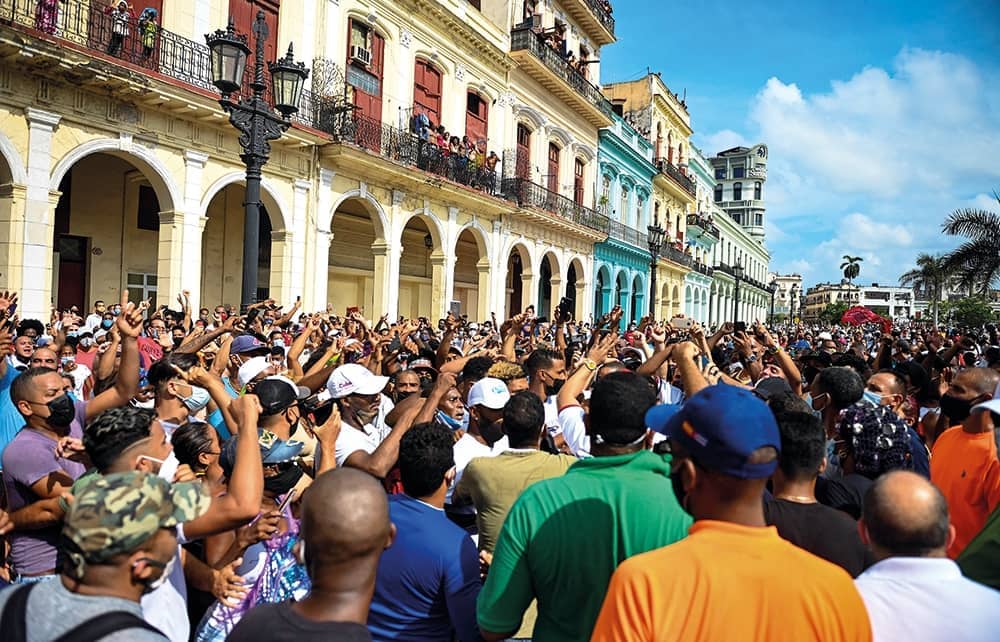In 1968, the US anthropologist Oscar Lewis arrived in Cuba with a tape recorder and a mission to capture the revolutionary zeal of everyday Cubans. Eighteen months later, he was sent packing. ‘We have nothing to hide,’ Fidel Castro, the leader of the country’s 1959 revolution, had supposedly told him. That wasn’t quite true: production targets were being missed, dissidents were being locked up and the US trade embargo was already beginning to bite.
The project briefly – and unsuccessfully – passed into the hands of Boom-era author and friend of Fidel, Gabriel García Márquez. After that, the voices of Cubans vanished from the official record. Lots of vituperative denunciations from Cuban exiles, certainly. But of the factory worker in Havana or the single mother in Cienfuegos, not a word.
How Things Fall Apart marks a hugely significant step at putting this right. After years of bureaucratic wrangling, Elizabeth Dore, an American academic based in the UK, persuaded the Cuban government to let her loose with a Dictaphone. Between 2004 and 2018, Dore and a small team of researchers interviewed 124 individuals, often multiple times.
One successful industrial engineer scrapes by on a salary of US$9 per month
Seven made the cut, their stories told here verbatim in chunks with precious little commentary. Among the colourful cast, we meet a ‘rural jack-of-all-trades’ who hawks sanitary towels on the street, a strident filmmaker who won notoriety for her student project about slum living and a successful industrial engineer scraping by on a salary of US$9 per month.
Their personal narratives alone make this book worth reading. Take ‘Mario’ (all the characters are anonymised, for obvious reasons): a bright kid from a poor, majority- black neighbourhood, he endured numerous setbacks – parental violence, racial prejudice, regular hunger – on his journey to university graduation and a top government job (all his bosses were fired for corruption).
Or ‘Esteban’, the grandson of a well-off gusano, or worm (the term for Cubans who left for Miami) and the son of divorced parents – one an ‘ultra-radical’ anti-government bus driver, the other a passionate Fidelista, who spent her youth teaching rural peasants to read and write. Esteban’s politics turn out to be patrilineal. Twice he tried escaping on a raft during Dore’s longitudinal study.
But the merits of How Things Fall Apart go far beyond the literary. First, there is the book’s timing. Dore’s interviewees are witness to a series of seismic political changes, starting with Fidel’s landmark handover of power to his brother Raúl (in 2006), via the latter’s staggered efforts to liberalise the economy, through to a brief entente cordiale with Cuba’s arch enemy across the Florida Straits – a rapprochement crafted by Barack Obama and quickly kiboshed by Donald Trump.
Second, this is no hatchet job. Unlike the vast majority of commentators on modern Cuba, Dore appears to have no clear ideological axe to grind. It is true that all her informants gripe continually – about shoddy salaries, lousy transport, lack of food and the gazillion other trials that come from living in a sclerotic state economy with no wealthy allies to help out (after the Soviets’ withdrawal in 1989, Venezuela briefly came to Cuba’s aid, but now the island is firmly on its own).
Such griping is born out of people’s real-world experiences, however, not a pre-hatched research agenda. Indeed, when one interviewee starts characterising his fellow Cubans as work-shy dole-collectors and arguing in favour of ‘each according to their contribution’ – a dictum of Raúl Castro’s regime and a tenet of small-state market economic liberalism – Dore admits to finding his posture ‘unsettling’.
The fact that Cubans feel ready to openly express political opinions of any kind indicates a notable shift. Historically, critics in Cuba have either fled the island or kept shtum. ‘Cubans whisper,’ a dissident-minded interviewee remarks at one point. ‘Inside the house we speak in one way, in the street another.’ Yet, in July last year, thousands of disaffected Cubans felt bold enough to take to the streets and shout aloud what Dore had been hearing for years.
As the title of this eye-opening book suggests, Cuba’s revolution has entered its end days. Not because the alternatives have proven themselves the winner; as one young informant states, all Cubans know that capitalism is ‘monstrous’ and ‘crude’ (even if the youth are willing ‘to give it a go’). Rather, blame lies with the revolution’s failure to bring about the egalitarian miracle so many early acolytes believed and fought for.
In this sense, How Things Fall Apart is, to borrow from Márquez, the chronicle of a death foretold. To quote Mario, a young Cuban today would rather become a hotel porter with tips than a top surgeon on a pitiful wage. Why? Because the youth have ‘lost faith in the future’. No religion can survive such apostasy, be it divine or otherwise.






Comments